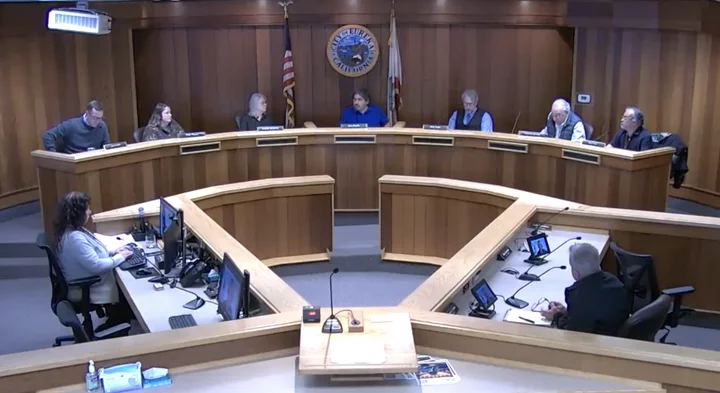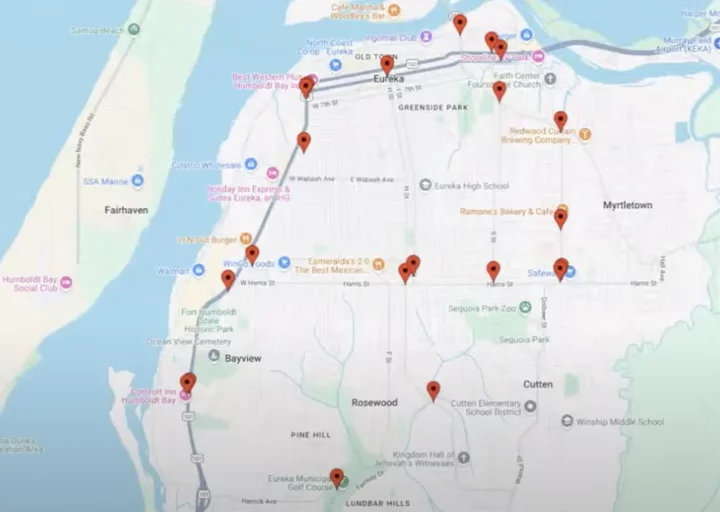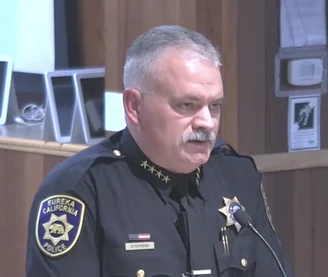Isabella Vanderheiden / Friday, Jan. 31, 2025 @ 4:35 p.m. / Agendizer
Eureka’s Police Oversight Board Weighs Pros and Cons of Automated License Plate-Reading Cameras; City Council to Review Draft Policy Next Week
Screenshot of Tuesday’s Community Oversight on Police Practices board meeting.
PREVIOUSLY: Eureka City Council Tables Decision on Police Surveillance Cameras, Citing Privacy Concerns
###
At next week’s meeting, the Eureka City Council will revisit a proposal from the Eureka Police Department to install 21 automated license plate-reading (ALPR) cameras along the city’s main thoroughfares to help local law enforcement track vehicles involved in crimes.
During the first review of the proposal in October, councilmembers expressed concerns about privacy protections and data sharing, despite EPD Chief Brian Stephens’ repeated assurances that the encrypted data would be stored in a “secured cloud base” only accessible by certain department staff. The council ultimately agreed to table its decision until the city’s Community Oversight on Police Practices (COPP) board had a chance to review the draft policy.
The technology, which would be provided by Georgia-based manufacturer Flock Safety, uses stationary cameras to collect license plate details from passing vehicles and stores that information in a database that allows law enforcement agencies to compare license plate numbers against those on stolen vehicles or associated with individuals wanted on criminal charges. ALPR cameras are positioned and designed to capture images of license plates, not vehicle occupants, and do not use facial recognition technology. The data would be deleted after 30 days, according to the draft policy.
Map of proposed ALPR camera locations. | Image via Flock Safety.
The technology has received widespread praise from law enforcement officials, including Stephens, who believe ALPR cameras help officers solve crimes more quickly and efficiently. The Humboldt County Sheriff’s Office implemented the county’s ALPR program in April 2024. Other local law enforcement agencies have looked into technology as well, including the Arcata, Fortuna and University police departments.
During the COPP board’s meeting on Jan. 28, Stephens recounted a situation where ALPR technology could have helped local law enforcement find the suspect vehicle within minutes.
“Last night, we had a stabbing in Old Town around First and W streets [where] the suspect left the scene … in a white sedan,” Stephens explained. “We knew enough about the car at the time [that] we could have put a white sedan into the Flock system and gotten some hits in that immediate vicinity [from] a camera that was close. … We were able to pull a picture of the [vehicle] off a surveillance camera. One of my officers recognized the suspect and the vehicle, and then we had a license plate.”
If ALPR cameras were being used in the city at the time of the incident, officers could have entered the license plate into the Flock system and “gotten a hit” on which direction it was headed, Stephens said.
“Luckily for us, the driver was very unstable and crashed his car near Weott in a single-vehicle collision and was taken into custody by the sheriff’s office,” he continued. “That’s just one of many examples that we have of crimes that have been committed recently in Eureka [where it] would have been very helpful to have this [technology].”
Like the city council, COPP board members expressed concerns about data sharing and security. Board member Mark Pardoe felt the city’s policy addressed most of his concerns surrounding privacy but asked if it was necessary to store ALPR data for 30 days.
“I read somewhere that the ACLU [American Civil Liberties Union] said you should save [the data] for three minutes,” Pardoe said, likely referring to this article. “Here we say 30 days. I think the CHP said 60 days. What’s the thought behind the 30 days? Why not three minutes? Why not 60 days? Why not longer?”
Hector Soliman-Valdez, director of community affairs for Flock Safety, said the company’s standard is 30 days, though some jurisdictions keep data for shorter and longer period of time.
“Our goal is to provide law enforcement with a tool that helps them solve the majority of crimes,” Soliman-Valdez explained. “We feel that the 30 days does that while protecting privacy, right? … There are many crimes that are not immediately reported, and that’s and that’s why it’s important … to have at least some time for law enforcement to investigate.”
Julie Ruhlin, a principal with OIR Group, the city’s independent police auditor, said her organization has helped Eureka and various other jurisdictions develop ALPR policies that are aligned with state law as well as best practices for the technology.
“It’s all about the balance and how you make the most use of the technology, while also limiting the potential downsides,” Ruhlin said. “While there may not be a national standard, 30 days does seem pretty standard. … Taking into account how law enforcement intends to use this, cutting it shorter than 30 days really can limit the usefulness in some key investigative ways.”
Board Chair Dino Novello expressed concern about ALPR data being accessed on a mobile device, such as a cell phone. Stephens couldn’t say whether the Flock system would be available on cell phones but noted that he can access someone’s “entire criminal history” on the mobile computer in his vehicle.
“There’s no information obtained [through the ALPR cameras] other than your license plate number, the color of your car and the type of car it is,” Stephens added.
The draft ALPR policy would require EPD to conduct an audit of the “ALPR detection inquiries” at least once per year. Novello felt EPD should conduct an audit more regularly.
Eureka City Manager Miles Slattery said the draft policy, as written, does not prevent the city from conducting an audit more than once a year. “We can do it more frequently than that if that’s what the board wants to recommend,” he said.
Overall, board member Melinda Ciarabellini felt the potential benefits of an ALPR system far outweigh “concerns of the officers’ potential impropriety,” adding that the technology could help EPD solve crimes much more quickly.
The COPP board did not vote on the item but directed staff to share its feedback with the city council.
###
The Eureka City Council will meet at 6 p.m. on Tuesday, Feb. 4, at Eureka City Hall — 531 K Street. You can check out the rest of the agenda, including creative interpretations of the document from our AgendaBot Gennie, below.
Eureka City Council
Feb. 4, 2025, 6 p.m.
A. MAYOR'S ANNOUNCEMENTS
1. Administer Oath of Office - Curtis Davis, Deputy City Attorney
B. PRESENTATIONS
C. BOARD/COMMISSION REPORTS
D. PUBLIC COMMENT PERIOD
E. PUBLIC HEARINGS
F. CONSENT CALENDAR
DOCUMENTS:
2. Fishermen's Terminal Pilings Replacement Project Bid No
3. Board and Commission Appointments
G. LEGISLATIVE ACTION CORRESPONDENCE
H. ORDINANCES/RESOLUTIONS
I. REPORTS/ACTION ITEMS
1. Budget Allocation for Eureka Operations Complex
The Eureka City Council is considering allocating $1.4 million for the Eureka Operations Complex project. This project aims to relocate the existing corp yard to a new location for public works headquarters. The city has already approved contracts and budget allocations for pre-construction services. The next steps include producing construction documents for site development and building construction. To finance the project, the city plans to utilize debt financing for a 30-year period. The proposed budget allocation will cover immediate expenses for site development work in 2025. The city council will need to approve the budget allocation for the project to proceed.
— LoCOBot
… or, as a high-energy radio advertisement!

Are you tired of pot holes and slow response times from city services? Are you looking for a city that takes pride in their infrastructure and emergency services? Look no further than the Eureka City Council!
We’re excited to announce the budget allocation for the Eureka Operations Complex, a state-of-the-art facility that will house all public works operations. With a focus on safety and efficiency, this complex will be a game changer for our city.
Approved by Project Manager Katie Marsolan, this allocation of $1.4 million will ensure that construction is completed on time and within budget. With a focus on strategic goals and vision, the Eureka Operations Complex will be a cornerstone of our city’s development.
Don’t settle for subpar city services - upgrade to the Eureka standard with the new Operations Complex. Stay tuned for updates on this exciting project and get ready for a brighter future in Eureka!
— LoCOBot
DOCUMENTS:
2. FLOCK Safety Automated License Plate Recognition cameras and technology
The Eureka City Council is considering implementing Automated License Plate Recognition cameras to help the police department track vehicles involved in crimes. The technology is meant to gather information about vehicles, not people, and is not connected to sensitive information databases. The goal is to help law enforcement identify stolen vehicles, wanted individuals, and solve crimes more effectively. The council is also considering concerns about privacy and data sharing. If approved, the technology could be a valuable tool for enhancing public safety in the community.
— LoCOBot
… or, as a town crier's speech!

Hear ye, hear ye! Citizens of Eureka, lend me your ears as I bring forth important news from the Eureka City Council regarding the implementation of FLOCK Safety Automated License Plate Recognition cameras and technology.
Presented by Chief of Police Brian Stephens, the recommendation before the Council is to receive a report and approve the implementation of fixed ALPR technology. This includes authorizing the City Manager to enter into a two-year contract with FLOCK Safety for 21 ALPR cameras and associated services.
The discussion surrounding the use of ALPR technology has taken into consideration concerns surrounding reproductive rights, undocumented community members, data sharing, and ownership. The updated policy has been presented to the Community Oversight of Police Practices (COPP) Board, which has approved moving forward with the implementation of this technology.
The Eureka Police Department seeks approval to install 21 ALPR cameras throughout the city to enhance public safety and combat crime. This technology is not facial recognition, does not collect sensitive information, and automatically deletes data every 30 days. It is a valuable tool for law enforcement to identify stolen vehicles, wanted individuals, and provide investigative leads following crimes.
The addition of fixed ALPR cameras will serve as a cost-effective force multiplier for the City, helping direct officers to where crimes are occurring and providing valuable leads for investigations. The technology has already seen success with the Humboldt County Sheriff’s Department and other local agencies, and could serve as a deterrent for criminals looking to target our community.
It is important to note that the data collected by ALPR technology is used to identify vehicles, not individuals, and is subject to strict policies and procedures to ensure privacy and accountability.
If approved by the City Council, the Eureka Police Department aims to have the cameras installed, the technology implemented, final policy in place, and department training completed by January 2025.
So, let it be known to all citizens of Eureka that the City Council is considering the approval of fixed ALPR technology for the betterment of our community’s safety and security. Your voices and concerns have been heard, and we are committed to implementing this technology responsibly and effectively.
Thank you for your attention and may the safety and well-being of our city remain a top priority for us all. That is all for today’s announcement from the Eureka City Council. Thank you and good day!
— LoCOBot
DOCUMENTS:
Staff Report • ALPR Policy - Eureka • CA - Eureka PD • MSA - CA - Eureka PD - Law Enforcement Agreement
J. FUTURE AGENDA ITEMS
K. CITY MANAGER REPORTS
1. Graffiti Abatement Update
L. PUBLIC COMMENT CONTINUED
M. COUNCIL REPORTS / CITY-RELATED TRAVEL REPORTS



CLICK TO MANAGE